|
|
The Holy Martyr Justin the Philosopher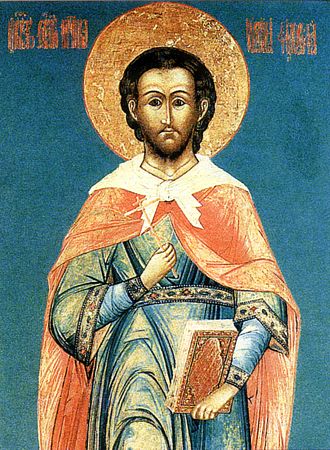 He was born of Greek parents in the Samaritan town of Shechem (formerly called Nablus), about a hundred and five years after Christ. He sought wisdom and philosophy with his whole heart, first with the Stoics, then with the Peripatetics, the Pythagoreans and finally with the Platonists. Although Platonic philosophy did not content him, it held him the longest, until he found something higher to attract him. By God's providence, he encountered a remarkable old man who began to undermine his Platonic philosophy, reminding him that a man cannot fully know the truth about God till God reveals it to him, and telling him that God had revealed the truth about Himself in the books of Holy Scripture. Justin began to read the Scriptures, and became an utterly convinced Christian, but he would not be baptised or call himself a Christian until he had convinced himself of the falseness of the accusations that pagans found to bring against Christians. Going to Rome for a philosophical gathering, he quickly gained much respect there, and many followers. He witnessed the martyrdom of St Ptolemy and St Lucian, and, seeing the tortures of these innocent Christians, wrote an Apologia for Christians and Christian teaching and gave it to the Emperor Antoninus and the Senate. The Emperor read it carefully and ordered that the persecution of Christians cease. Justin took a copy of the Emperor's decree and went off to Asia, where he saved many persecuted Christians by its aid. After that, he returned again to Rome. When a persecution arose under the Emperor Marcus Aurelius, he wrote a second Apologia and addressed it to the Emperor. Some disreputable philosopher, Crescens, a Cynic, denounced him as a Christian because Justin was getting the better of him in every dispute, and Justin was thrown into prison. Desiring his death, and fearing that judgement would not be given against him, Crescens took the opportunity to administer poison to him in the prison. Thus this great defender of the Christian faith finished his earthly course and went to the blessedness of eternity, in the year 166. He was born of Greek parents in the Samaritan town of Shechem (formerly called Nablus), about a hundred and five years after Christ. He sought wisdom and philosophy with his whole heart, first with the Stoics, then with the Peripatetics, the Pythagoreans and finally with the Platonists. Although Platonic philosophy did not content him, it held him the longest, until he found something higher to attract him. By God's providence, he encountered a remarkable old man who began to undermine his Platonic philosophy, reminding him that a man cannot fully know the truth about God till God reveals it to him, and telling him that God had revealed the truth about Himself in the books of Holy Scripture. Justin began to read the Scriptures, and became an utterly convinced Christian, but he would not be baptised or call himself a Christian until he had convinced himself of the falseness of the accusations that pagans found to bring against Christians. Going to Rome for a philosophical gathering, he quickly gained much respect there, and many followers. He witnessed the martyrdom of St Ptolemy and St Lucian, and, seeing the tortures of these innocent Christians, wrote an Apologia for Christians and Christian teaching and gave it to the Emperor Antoninus and the Senate. The Emperor read it carefully and ordered that the persecution of Christians cease. Justin took a copy of the Emperor's decree and went off to Asia, where he saved many persecuted Christians by its aid. After that, he returned again to Rome. When a persecution arose under the Emperor Marcus Aurelius, he wrote a second Apologia and addressed it to the Emperor. Some disreputable philosopher, Crescens, a Cynic, denounced him as a Christian because Justin was getting the better of him in every dispute, and Justin was thrown into prison. Desiring his death, and fearing that judgement would not be given against him, Crescens took the opportunity to administer poison to him in the prison. Thus this great defender of the Christian faith finished his earthly course and went to the blessedness of eternity, in the year 166.The Holy Martyrs Justin, Chariton, Euelepistus, Hierax, Peon, Liverianus and Justus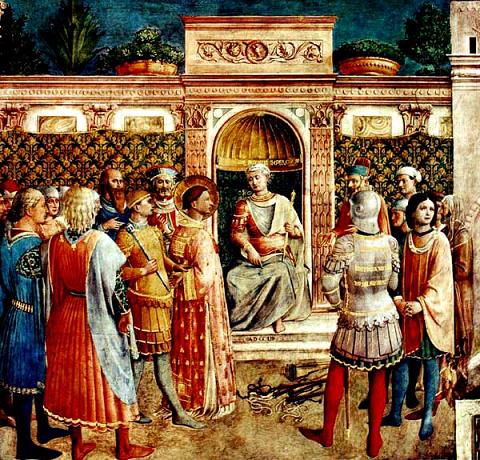 These all suffered in Rome in the time of Marcus Aurelius and the Eparch Rusticus. When Rusticus asked: "Do you think that, if you die for Christ, you will receive a reward in heaven?", Justin replied: "We do not think it; we know!" They were all then beheaded, in 163, and went to the Kingdom of Christ our God. These all suffered in Rome in the time of Marcus Aurelius and the Eparch Rusticus. When Rusticus asked: "Do you think that, if you die for Christ, you will receive a reward in heaven?", Justin replied: "We do not think it; we know!" They were all then beheaded, in 163, and went to the Kingdom of Christ our God.Our Holy Father Agapitus of the Kiev Caves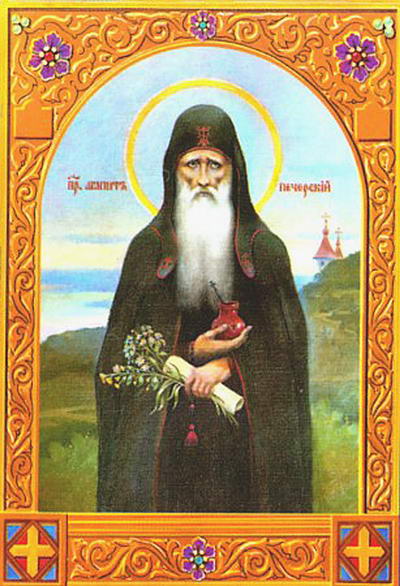 A natural doctor, he was a disciple of St Antony of Kiev. He healed people by prayer and the prescribing of cabbage, which they made into a sort of bread. Prince Vladimir Monomachus was healed in this way, and this made Agapitus famed on all sides. The Prince"s doctor, an Armenian, hearing of this, began to spread slander about him. When Agapitus became ill, the Armenian came and, looking at him, said that he would die in three days and that, if he did not do so, then he, the Armenian, would become a monk. Agapitus told him that it had been revealed to him by God that he would die, not in three days but in three months. And so it came to pass. After Agapitus"s death, the Armenian went to the abbot of the Monastery of the Caves and asked him to make him a monk. He explained that Agapitus had appeared to him from the other world and reminded him of his promise. And so the one-time envier became a humble monk, by the providence of God whose care it is that all men be saved. St Agapitus entered into rest in about 1095. A natural doctor, he was a disciple of St Antony of Kiev. He healed people by prayer and the prescribing of cabbage, which they made into a sort of bread. Prince Vladimir Monomachus was healed in this way, and this made Agapitus famed on all sides. The Prince"s doctor, an Armenian, hearing of this, began to spread slander about him. When Agapitus became ill, the Armenian came and, looking at him, said that he would die in three days and that, if he did not do so, then he, the Armenian, would become a monk. Agapitus told him that it had been revealed to him by God that he would die, not in three days but in three months. And so it came to pass. After Agapitus"s death, the Armenian went to the abbot of the Monastery of the Caves and asked him to make him a monk. He explained that Agapitus had appeared to him from the other world and reminded him of his promise. And so the one-time envier became a humble monk, by the providence of God whose care it is that all men be saved. St Agapitus entered into rest in about 1095.Venerable Justin (Popovich) of Chelije in Serbia (1979)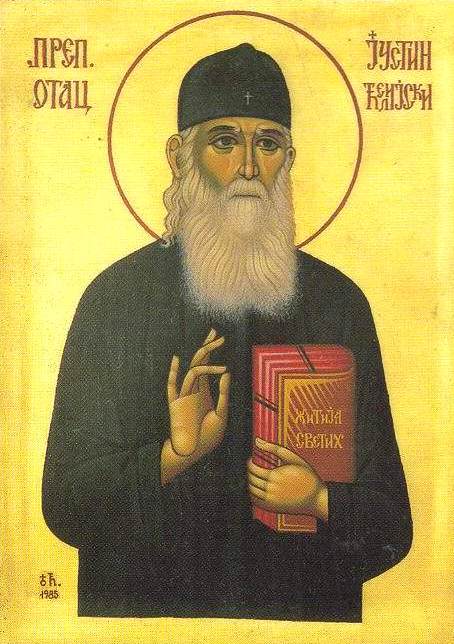 Abbot of Chelije Monastery in Valjevo, western Serbia, was born to pious and God-fearing parents, Prota (Priest) Spyridon and Protinica (Presbytera) Anastasia Popovich, in Vranje, South Serbia, on the Feast of Annunciation, March 25, 1894. He was born into a priestly family, as seven previous generations of the Popoviches (Popovich in Serbian actually means "family or a son of a priest") were headed by priests. At baptism, he was given the name Blagoje, after the Feast of the Annunciation (Blagovest means Annunciation or Good News). Being raised in a pious Christian atmosphere, young Blagoje learned quite early of the virtuous life in Christ as dedicated in service to God's holy Church. As a child, he often visited with his parents the Prohor Pchinjski Monastery, dedicated to St. Prophor the Miracle worker (see Oct. 19th)... Abbot of Chelije Monastery in Valjevo, western Serbia, was born to pious and God-fearing parents, Prota (Priest) Spyridon and Protinica (Presbytera) Anastasia Popovich, in Vranje, South Serbia, on the Feast of Annunciation, March 25, 1894. He was born into a priestly family, as seven previous generations of the Popoviches (Popovich in Serbian actually means "family or a son of a priest") were headed by priests. At baptism, he was given the name Blagoje, after the Feast of the Annunciation (Blagovest means Annunciation or Good News). Being raised in a pious Christian atmosphere, young Blagoje learned quite early of the virtuous life in Christ as dedicated in service to God's holy Church. As a child, he often visited with his parents the Prohor Pchinjski Monastery, dedicated to St. Prophor the Miracle worker (see Oct. 19th)...Venerable Dionysius, abbot of Glushitsa (Vologda) (1437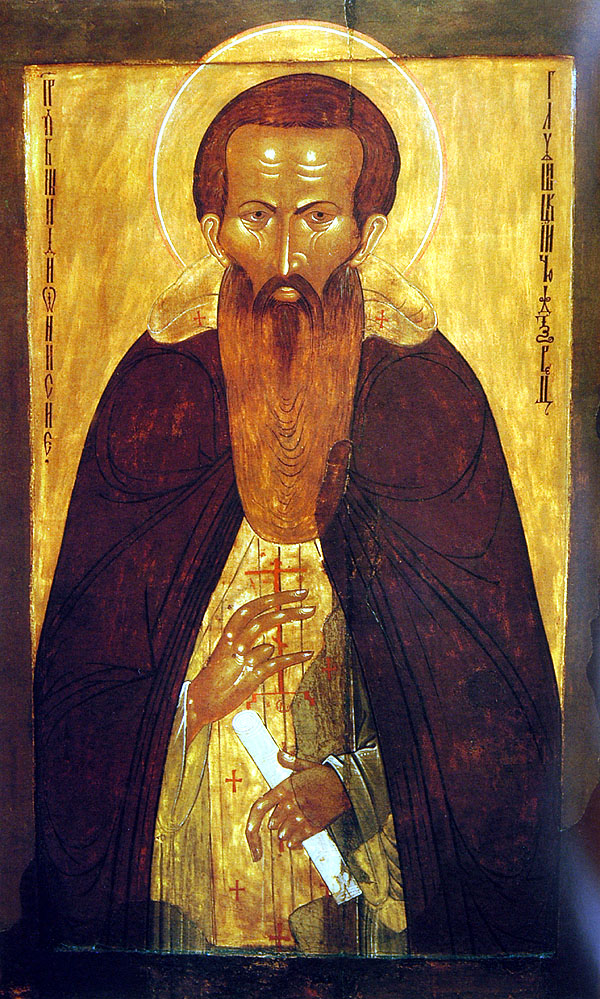 Our holy Father Dionysius, a native of Vologda, was one of the greatest ascetics of Russia’s Northern Thebaid (See A. Muraviev, The Russian Thebiad of the North, St Petersburg, 1855), and had links to some of the most important figures of Russian monasticism, including St Cyril of White Lake (June 9), whose portrait he painted... Our holy Father Dionysius, a native of Vologda, was one of the greatest ascetics of Russia’s Northern Thebaid (See A. Muraviev, The Russian Thebiad of the North, St Petersburg, 1855), and had links to some of the most important figures of Russian monasticism, including St Cyril of White Lake (June 9), whose portrait he painted...Hieromartyr Pyrrhus the Virgin
Martyr Firmus of Magus (3rd c.)
Martyr Thespesius of Cappadocia (230)
Holy Martyrs Shio the New, David, Gabriel and Paul of Gareji (1696)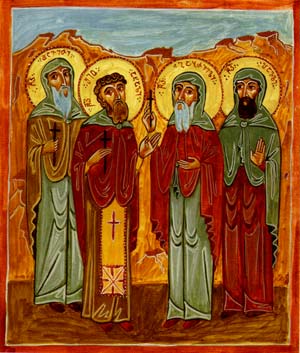 The holy monk-martyrs Shio the New, David, Gabriel and Paul labored in the David-Gareji Wilderness at the end of the 17th century. St. Shio was from the village of Vedzisi in the Kartli region. His parents, Papuna and Tamar, were wealthy and highly influential people. They had eight children: five sons and three daughters. After their parents died, Shio’s brothers quarreled so intensely over their inheritance that the eldest brother finally killed the youngest... The holy monk-martyrs Shio the New, David, Gabriel and Paul labored in the David-Gareji Wilderness at the end of the 17th century. St. Shio was from the village of Vedzisi in the Kartli region. His parents, Papuna and Tamar, were wealthy and highly influential people. They had eight children: five sons and three daughters. After their parents died, Shio’s brothers quarreled so intensely over their inheritance that the eldest brother finally killed the youngest... |